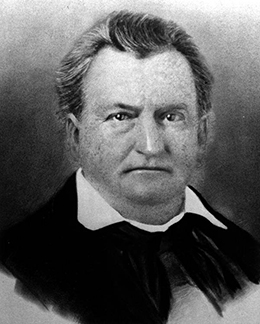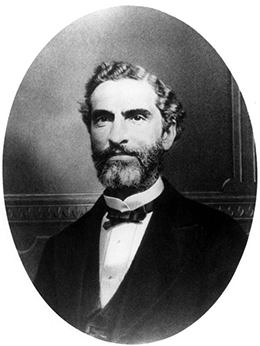Distant Storm: Florida's Role in the Civil War
A Sesquicentennial Exhibit
Florida’s Role in the Civil War
Florida’s Role in the Civil War, 1861-1862
A Crisis of Confidence
Financial claims on Florida were one of many problems confronting the state’s government during the first year of secession. Amidst rumors of an impending Yankee invasion in the fall of 1861, political leaders became increasingly critical of the leadership of Governor John Milton.
Some of the most vocal critics came from members of Florida’s secession convention, which reconvened in Tallahassee on January 14, 1862, largely in opposition to Milton’s direction of Florida’s war effort.
In order to curb Milton’s power, the secession convention voted to create an executive council to work alongside the governor in managing the state’s affairs. Based on South Carolina’s wartime executive council, the Florida executive council consisted of four members: James A. Wiggins (Marion County), Mariano D. Papy (Leon County), W. D. Barnes (Jackson County), and Smith Simkins (Jefferson County).
Governor Milton opposed the creation of the executive council. He made it clear that while he would attend its meetings, he considered the body an unconstitutional intrusion on his authority. Fortunately for Milton, Florida’s executive council was never as strong as the South Carolina council, which carried out an extensive reorganization of that state’s defense. The Florida council ended up supporting rather than opposing most of the governor’s decisions. The council only met five times and only one member, former Attorney General Mariano Papy, attended all five sessions: Simkins (4), Wiggins (3), and Barnes (1).
Among the resolutions the council endorsed were measures designed to strengthen Milton’s position as the state’s commander-in-chief. The council agreed that Milton had the authority to declare martial law in threatened areas, seize private arms, and reorganize the state militia, which the secession convention had voted to disband. The convention argued that since the Confederate government had assumed control of Florida’s defense the state no longer needed to fund the militia. When the secession convention voiced its opposition to the rebirth of the militia, however, the council members, over Milton’s strenuous objection, repealed the reorganization. The repeal left Florida without a militia just after the Confederate army had withdrawn virtually all of its men from the state. In the coming months, Milton’s leadership seemed more foresighted to Floridians, including many elected officials.
The minutes of the sessions of the executive council provide a glimpse into the deliberations of this unusual governmental body. Along with South Carolina, Florida was the only other Confederate state to adopt an executive council during the war. The minutes from the first meeting of the executive council on February 28, 1862, record Governor Milton’s opposition to the existence of the council but also his willingness to cooperate with its proceedings.
Minutes of the Executive Council, February 28, 1862 (Series 82, 1862)

Minutes of the Executive Council, February 28, 1862 (Series 82, 1862)
1ST
Executive Department
Tallahassee February 298th 1862
This day 12 o clock pm. Messers Papy, Wiggins and Smith Simpkins, Esquires, presented themselves to His Excellency the Governor as the Executive Council appointed by the late Convention.
Governor Milton, in reply said to the gentlemen, that in his opinion the late “Convention” had no right as a political body claiming to represent the people to have assembled, and no right after the Constitution had been adopted and promulgated and the Officers of the State Civil and Military had been sworn to support it, to amend it.
The Constitution could only be amended in the manner therein provided, and the power to legislate belonged exclusively to the General Assembly of the State agreeably to their Constitution. The Convention had no right to legislate, that there was (no) intelligent member of the Convention who was not previously informed (previously) to their assembling of his opinions upon the subject as made known to the Genl Assembly, that he had frankly avowed these opinions to the first Committee which had visited the Executive Department, in presence of Col. A. A. Fisher and Dr. E. Barnard who were then present, and are now present, that he as Governor, however did not arrogate to himself to decide upon the powers of the Constitution.
The question of its powers was one for the Judicial Department of the Government, that the exigencies of the times demanded harmony, and that he would cheerfully cooperate with them so far as he could do so consistently with the Constitution and Laws of the State, which as Governor he had sworn to preserve, protect, and defend, and that he entertained the hope that they would
2ND
council together and act harmoniously and accomplish some benefit for the States without infringing the obligations imposed by the Constitution, while at the same time he did not admit any power claimed by them derived from the Convention, therefore having made known frankly the opinions which he entertained, and agreeably to which he should act, if agreeable to them, he would endeavor to act in harmony with them, and was ready to afford them every facility to render their efforts useful to the State.
To avoid the Expences, Gentlemen of your continuous attention to the duties with which you conceive yourselves to be invested, I will add, that whenever as Governor of the State, I consider your attendance necessary at the Capitol, I will (advise) you of the time and occasion.
The Council was then called to Order and adjourned to meet at “7 o clock” tonight.
Attest E. Barnard
Private Secretary to His Excellency
Friday 28th. Febry. Messers. Papy, Wiggins and Simpkins met His Excellency at the hour appointed, and after discussing the state of affairs adjourned at “half past 9 o clock” to meet to meet in the morning at 9 o clock.
Attest E. Barnard
Private Secretary to His Excellency

 Listen: The World Program
Listen: The World Program

